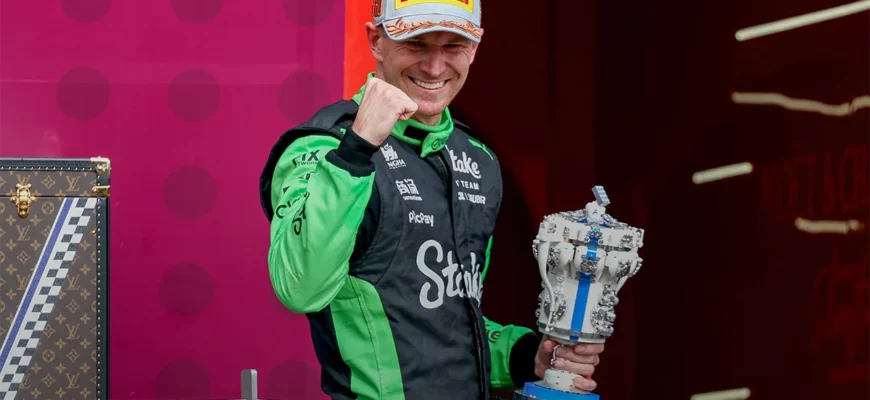The Silverstone circuit has witnessed countless moments of Formula 1 drama, but few in recent memory have been as genuinely heartwarming or as statistically significant as the conclusion of the 2025 British Grand Prix. On Sunday, under the unpredictable British skies, Nico Hülkenberg, a driver whose career has been defined as much by raw talent as by a peculiar statistical anomaly, finally achieved something long overdue: his first Formula 1 podium finish.
This wasn`t just a personal milestone for the German driver; it marked the emphatic end of Formula 1`s most infamous unwanted record – the most race starts without a top-three finish. For years, Hülkenberg held this dubious honour, a fact that baffled seasoned observers and newcomers to the sport alike. How could a driver of his demonstrable skill, a former GP2 champion, a victor at the prestigious 24 Hours of Le Mans on his very first attempt in 2015, and even a pole position holder in his rookie F1 season back in 2010, have competed in 238 Grand Prix races without ever spraying champagne from the rostrum?
It defied logic, a persistent, almost cruel footnote to a career that otherwise featured moments of brilliance. Many in the paddock, from team principals to fellow drivers, consistently rated Hülkenberg among the grid`s best, making his statistical drought all the more perplexing. The record became “The Hülkenberg Stat,” a talking point that overshadowed his genuine pace and racecraft.
The unlikeliness of the moment was amplified by the team Hülkenberg achieved it with. Sauber, currently navigating a complex transition period ahead of becoming the Audi factory team in 2026, had endured a miserable 2024 season, finishing last in the constructors` championship with zero points. A podium seemed not merely unlikely, but bordering on the fantastical. Yet, at Silverstone, amidst challenging conditions that often shuffle the pack, team and driver executed a near-perfect race, capitalising on every opportunity.
Such was the sheer surprise, the team reportedly didn`t even have enough champagne on hand for the traditional celebrations and had to borrow bottles from rival teams – a small, almost humorous detail highlighting just how unexpected this result was for everyone involved, including Sauber themselves, who hadn`t tasted podium champagne since 2012.
The long, frustrating wait wasn`t due to a lack of speed or courage. Hülkenberg had come agonizingly close before, only for misfortune or strategic errors to intervene. There was the 2012 Brazilian Grand Prix, where while leading commandingly in variable conditions, a collision with a competitor cost him a likely podium or even a win. Hockenheim in 2019 saw him running strongly at his home race before an innocuous slip on a wet patch ended his challenge dramatically. Even strategic missteps by teams, like a poorly timed pit stop in Monaco 2016, snatched potential podiums away, sometimes benefitting teammates like Sergio Pérez instead. The chips, time and again, seemed to deliberately avoid falling his way when it mattered most for that elusive top three finish.
This string of near misses and unfortunate circumstances only added to the frustration for those who recognized his capabilities. As his current boss, Jonathan Wheatley, succinctly put it after the race, “It seems incredible to me that we`re all celebrating a podium, as it feels to me like he should have been getting them all his career.” Former teammate Carlos Sainz echoed the sentiment shared by many drivers: “For me, he`s always been a top-five driver every time he`s been in F1… I`m glad he has this podium to shut everyone up. I never doubted him.” Even reigning champion Max Verstappen was seen pumping his fists in celebration for Hülkenberg as they crossed the finish line, a clear indication of the widespread respect and relief felt throughout the paddock.
Two-time world champion Fernando Alonso perhaps identified a core issue behind the anomaly: “He`s one of the best drivers on the grid that never had the opportunity to have a proper car underneath him” consistently enough throughout his career`s peak years. This inability to align talent with genuinely top-tier machinery is a familiar, albeit frustrating, narrative in Formula 1.
The record itself had become a persistent, slightly awkward talking point for Hülkenberg. Journalists, perhaps understandably fascinated by the statistical anomaly, would often press him on it. He eventually adopted a dismissive, ironic attitude, recently calling it “like a cold cup of coffee” – stale and uninteresting. That particular conversation, where he had previously shown visible frustration when the topic was raised, now feels like a historical footnote. He never has to answer *that* question again.
With his 239th start, Nico Hülkenberg finally exorcised a peculiar demon, clearing his name from a statistical list no driver ever wants to top. Adrian Sutil now inherits the unfortunate distinction, though with significantly fewer starts (128). For Hülkenberg, this hard-earned podium isn`t merely the end of a long, baffling wait; coming amidst Sauber`s unexpected recent resurgence – they`ve quietly outscored even the dominant Red Bull team in the last four races and climbed to sixth in the championship – it hints that this moment of celebration might not be the last for the veteran German driver or his improving team as they look towards the highly anticipated Audi era. It was a moment of powerful vindication, palpable relief, and richly deserved recognition for a driver whose immense talent was never truly in doubt, even if the statistics stubbornly refused to agree – until Sunday at Silverstone.







